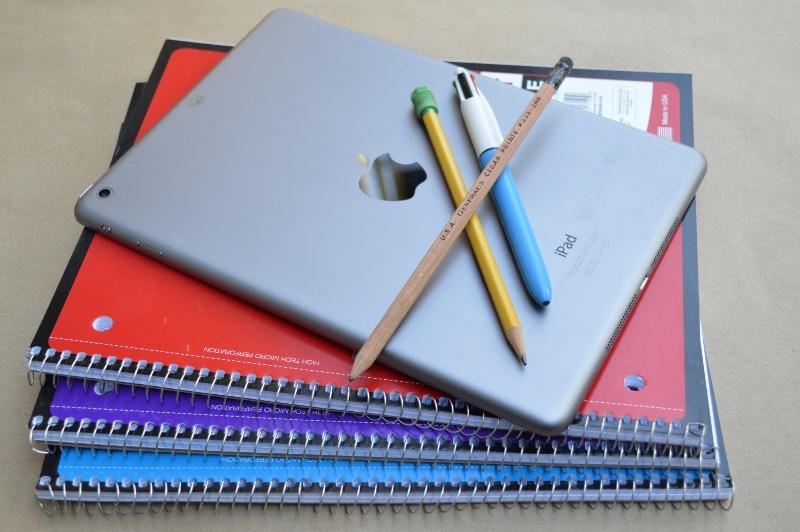On the Death of Paper
May 25, 2016
Time and time again, we have seen technology replace older, obsolete tools. We have traded sticks for plows and horses for cars. And here, at La Salle, as well as in thousands of schools across the country, we see iPads replacing books and paper. iPads seem to offer many advantages: they are lighter, smaller, and can carry iBooks that weigh nothing, whereas your thick AP Physics textbook can seem to weigh on you like the sky on Atlas’ back. They are able to connect to the Internet over WiFi, and allow students to more easily and effectively collaborate with fellow students and teachers. The hefty price of the iPad itself can even be justified by the steep drop in prices that most textbooks have when purchased in eBook form, for the digital versions usually are a fraction the cost.
Gone are the days of heaving your bag with seven books accompanied by their notebook and binder counterparts; gone are the days of having to scrounge some pen or pencil from the ground, only to lose it in the next class. Now all you have to worry about is your one iPad, which has all its information backed up in the cloud.
But are we losing something in this shift to technology? Let’s look at the facts. Studies have shown that students remember more from their lectures when the information is processed by the brain, and then written down by hand, than if they had typed or just taken a picture of the notes presented to them.
iPads also present an opportunity for cheating that La Salle and other schools had never seen before. The easy access to Airdrop, iMessage, or any other app that allows photo or text sharing or streaming lets students cheat at a level that is completely unprecedented. And even app blockers (like the one currently on Snapchat) aren’t very effective when students can simply bypass them with some help from a friend that has some tech knowledge. This allows students to easily and discreetly share answers with friends from another class, or send photos of a completed assignment.
Even without students sharing answers or information themselves, they can even more easily access “study” websites like SparkNotes, CliffsNotes, or the holy grail that is Shmoop and get last night’s assigned reading in a few concise paragraphs.
Cheating and academic dishonesty aside, iPads still have several other prevalent flaws. Games, texting, video streaming services, social media, and other forms of entertainment all can prevent students from learning or distract people around them who are trying to learn. They can also teach students that plagiarism or general academic dishonesty is okay. Plenty of students don’t realize that many colleges and universities will expel someone for one plagiarized piece, whether it be another student’s work or Shmoop’s.
The price barrier could turn off some prospective students as well: La Salle offers a lot of financial aid to students from all over Portland and the surrounding area. Some potential students may not be able to afford the iPad needed to be at La Salle, or just might not see the value of having this piece of technology. In addition, making the investment in an iPad for four years is risky; the possibility of an iPad being stolen, broken, or lost could seem too great for some families.
We cannot simply repeal the iPad program now that students and freshmen this year have invested hundreds of dollars in them, but neither can we allow ourselves to stay the course and hope that students will actually do their work; we’ll just get better at hiding it. This is why I believe that pushing this school into a “tech-friendly” campus was a bad idea, as we now find ourselves without an easy option to take a middle path.
The convenience of being able to submit assignments online or easily access the Internet are far outweighed by the gross amount of dishonesty and apathy that the iPads allow to occur. While the choice to cheat ultimately comes down to the person, iPads present too much of a temptation for many students.
Simply put, iPads are the way of the future, whether we like it or not. School systems all over the country, if they have the money, are switching to this new system. As a result, we must find more ways to effectively incorporate this new technology, which has great educational potential, into our school. We must take a step back and ask ourselves how much we actually need the iPads: is it necessary to use them every class? Is it necessary to take notes on Notability rather than on paper?
I would encourage teachers to find ways to incorporate the iPads in their classes in a way that allows them to be tools only for learning, not simply an easy way to not pay attention in class. Perhaps by being more clear with the expectations for iPad use and limiting the amount of time students have on the devices, we can create an environment where education can be more fully enhanced by the iPads.
However, this shift in technology is not just in the educational system. We see it every day, with people buried in their phones on the street, in their homes, or even in their cars. Our own transition to a tech-friendly campus is reflective of this societal shift. We took the opportunity to throw out the old system in favor of a newer, shinier one, much like what is going on worldwide today. While this shift is inevitable and will only accelerate in the coming years, it is important that in the transition we don’t lose our humanity in the machines we built to serve us.





